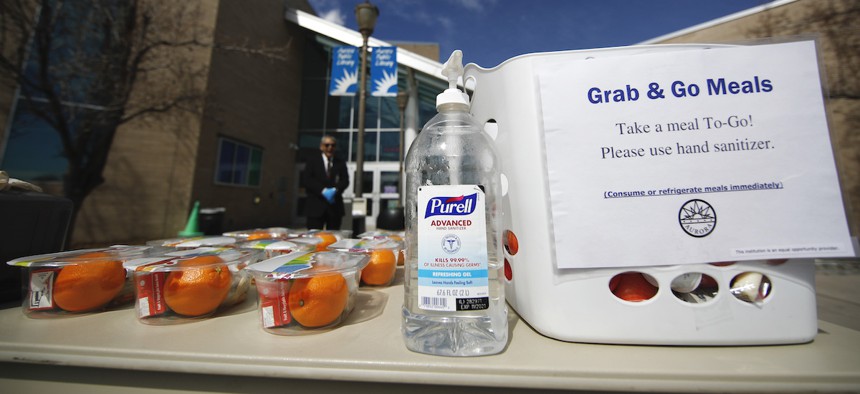Amid Closures, Libraries Find New Ways to Provide Services

A bottle of hand sanitizer stands next to free lunches for people under the age of 18 outside the Aurora Public Library on Wednesday, March 25. Associated Press
As their branches close to protect public health, librarians turn to virtual programming and relief efforts to continue serving their communities.
The doors to the public library in Coeur d’Alene, Idaho, closed on March 16 as the city restricted public amenities to prevent the spread of the coronavirus. But community members can still attend story hour, play “social-distancing bingo” and talk about books with librarians—all online, from the comfort of their own homes.
“We’re in the field of information, and people tend to think of that as being about books,” said Mandi Harris, youth services supervisor for the Coeur d’Alene Public Library. “But for me, sometimes that information can be as simple as saying, ‘You’re seen, you’re heard, and you’re loved,’ so I’m just shifting that to the online realm.”
Across the country, shuttered libraries have acted quickly—and creatively—to continue engaging their communities. In Illinois, the Oak Park Public Library launched an online "Book Madness" tournament, while the Richland Library in Columbia, South Carolina, created a Facebook group for caregivers and educators to share tips and activities to keep kids engaged and entertained at home. The Brooklyn Public Library launched an extensive catalog of virtual programming, ranging from virtual craft circles, to drag queen story hour and video game tournaments.
Virtual programming isn’t new for libraries, but many have rapidly expanded their online offerings and gotten creative with new initiatives as residents—and librarians—hunker down at home, said Curtis Rogers, a spokesman for the Urban Libraries Council.
“Before this outbreak, many libraries already offered virtual storytime programs, online education courses and digital trainings geared towards lifelong learning,” he said. “However, the unique circumstances of the Covid-19 pandemic have challenged libraries to quickly expand the frequency and scope of virtual programs. As a result, libraries are experimenting with brand-new approaches and learning daily as circumstances continue to rapidly evolve.”
In Coeur d’Alene, quarantine programming has so far included story time videos for different ages (15-minute board-book stories for infants, pajama-clad nighttime readings of stories by local authors for older kids), how-to videos demonstrating science projects that parents and kids can do at home, and a campaign to have children send letters to senior citizens, who may be especially lonely in quarantine.
The library had initially offered curbside pickup for books and other materials, Harris said, but suspended that service after administrators determined that it was encouraging people to congregate in front of the building.
In Flathead County, Montana, librarians have posted early literacy classes for children along with science programming and art projects, and have continued a weekly trivia contest—usually hosted at area breweries—on Facebook. Some of the videos are decidedly low-tech, filmed on cell phones propped on cardboard boxes in the corner of librarians’ living rooms. But the specs don’t matter, said Ellie Newell, youth services librarian at ImagineIF Libraries.
“What’s important is that children and families are seeing their beloved librarians, who they see every week, singing those familiar songs and reading those familiar books,” she said. “The quality of the video kind of doesn’t matter, the quality of the sound kind of doesn’t matter. It’s all about spiritual and psychological support, and creating a sense of normalcy and routine and love for children who are, frankly, scared right now.”
Other libraries have converted their closed buildings into new types of community service. The public library in downtown Spokane, Washington, will provide temporary shelter to homeless people through at least mid-May. In California, the Oakland Public Library is asking residents to use the book return bins at its main branch to donate unused face masks, while the St. Louis County Library is partnering with a diaper bank to provide diapers to needy families at drive-through pick-ups at four library branches.
“Many libraries have temporarily closed the doors to their buildings, but that doesn’t diminish their essential role in supporting community health, resilience and stability,” Rogers said. “In fact, that role is more important than ever as the Covid-19 outbreak has an increasingly devastating impact on our economies, workforce and social connectivity.”
With no end to quarantine measures in sight—protocols vary by state, but the Trump administration this week extended social-distancing guidelines through the end of April—libraries are continuing to brainstorm new ways to provide services. In some ways, that’s difficult, but in others, it’s freeing, Harris said.
“We always grow through challenges,” she said. “When you have these strict parameters, it makes it easier, in a way, to be more creative, because you're taking risks and doing things you might not have done if you still had the ability to meet in person.”
OTHER STORIES on Route Fifty:
NEXT STORY: How Food Stamps Can Help People During Hard Economic Times Like These





